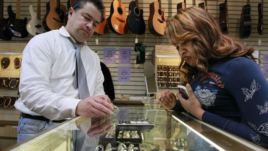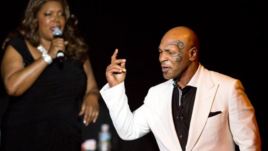
CHRISTOPHER CRUISE: Welcome to THIS IS AMERICA in VOA Special English. I'm Christopher Cruise.
JUNE SIMMS: And I'm June Simms. This week, we tell you about pawn shops and the people who own them - pawnbrokers. We also tell about former boxing champion Mike Tyson and his recent one-man show.
(MUSIC)
CHRISTOPHER CRUISE: Pawn shops are businesses where people bring their possessions to sell or to get a short-term loan. The United States has about 10,000 of them.
In the past few years, pawn shops have been doing business with more people than ever before. That is because many lenders now do business only with individuals having good credit ratings or a high-paying job. Often, the individuals most in need of a loan have poor credit ratings. But they do not need a good job or credit rating to get a loan from a pawnbroker. They only need something of value.
When a traditional lender approves a loan, it may be days or weeks before an individual receives the money. But pawnbrokers will give a loan in just a few minutes based on the resale value of an object and without asking about the person's job or credit history.
JUNE SIMMS: Many pawn shops specialize in jewelry. But most shops accept almost anything of value, including computers, musical instruments, guns, old coins and other antiques. The item itself acts as the security, or collateral, for the loan. If the loan is not repaid, the object can be sold.
Customers can get the object back -- called redeeming it -- at any time by repaying the loan plus the interest and fees they agreed to pay. Or they can pay the interest and leave the item at the pawn shop for a while longer.
CHRISTOPHER CRUISE: The National Pawnbrokers Association is a national trade group representing pawnbrokers. The association calls pawn-brokering "one of humankind's oldest financial institutions." It says pawnbrokers operated 3,000 years ago in ancient China and in early Greek and Roman times.
Pawn shops may be large or small, clean or dirty, but they are all full of stories. This may explain the popularity of television shows like "Pawn Stars" on the History Channel. The show is about a family of pawnbrokers in Las Vegas, Nevada.
(SOUND)
Another program, called "Hard Core Pawn," is on the TruTV network. It shows a pawnbroker and his grown children in a large pawn shop in Detroit, Michigan. These programs are among the most-watched shows on the two cable stations.
JUNE SIMMS: Some pawnbrokers say the television shows have made people more willing to consider the idea of pawning their possessions. But others say the programs are misleading because they often show people selling things to the pawnbroker. Pawnbrokers say few people want to sell their belongings. In fact, they may need the item to pawn later. Pawnbrokers say they make more money loaning money than buying items and reselling them.
The National Pawnbrokers Association works to improve the image of the industry. It says pawnshops must follow many federal, state and local laws. The association gives training to its members on how to obey those rules, and urges pawnbrokers to do business in an honest way. It also works to establish good relationships with government and law enforcement officers.
CHRISTOPHER CRUISE: Kevin Prochaska is head of the National Pawnbrokers Association. He owns 13 pawn shops in Texas. Mr. Prochaska says 60 to 70 percent of his loans are on jewelry. He says it may seem like pawnbrokers make a lot of money, but they have a lot of costs.
KEVIN PROCHASKA: "In my business, my typical stores, we make 20 loans a day, and like I said the average loan's 150 dollars. So, you know the pawn service charge on that is, if everybody came and picked up their items, you'd get 30 dollars per 150. And that seems like a big number. But when you're doing 30 times 20 you're bringing in 600 dollars a day in revenue. You've got three or four people working there, you've got the rent, you've got the utilities."
There are pawn shops in some wealthy areas in the United States. But such businesses are the exception. The fact is, most pawn shops are in poorer neighborhoods. Most people who pawn items do not earn a lot and have little money saved.
JUNE SIMMS: Not everyone believes pawnbrokers provide a good service. Critics have accused them of abusing the poor by charging high interest rates. But pawnbrokers say the high rates are the result of high business costs, including security and storage. And they say pawning an item may be less costly than losing electricity or heat.
Another criticism involves the custom of "low-balling." This is telling an uninformed customer that an item is worth less than it really is. But the opposite also happens. Customers sometimes invent stories about items and claim they are worth more than they are. That is why pawnbrokers must know a lot about many different things. They have to estimate the age of an item, as well as whether it is valuable or worthless.
(MUSIC)

CHRISTOPHER CRUISE: Mike Tyson has lived a very public life. He recently appeared in a one-man show at the MGM Grand hotel in Las Vegas. The MGM Grand is where the former boxer fought some of his biggest fights. The show was called "Undisputed Truth" because, for years, Mike Tyson was the undisputed world heavyweight boxing champion.
He began the show by promising the crowd that he was planning to tell his story in his own words. But some of the show was written by others, including his wife.
Much of what Mike Tyson said during his show cannot be broadcast. That is because his language – like his life – was often shocking, threatening and disrespectful, although it could also be funny.
JUNE SIMMS: Mike Tyson has been called "the baddest man on the planet." He was once one of the most-feared boxers ever. But he said he is now just a "devoted husband and loving father." He told the crowd his "life has come full circle." In his words, "I'm pretty happy for the first time in my life. I'm very thankful for all my blessings."
These are things Mike Tyson has said before. But stability and happiness have always seemed to be short-term visitors in his life. He has had major successes and even bigger failures. He was the youngest boxing champion in history. He also earned – and spent – an estimated 400 million dollars.
People he trusted, he says, stole much of his money or did a poor job protecting it. He also paid a lot of money to end earlier marriages. In 2003 he was unable to pay his debts and declared bankruptcy. He blamed it on his uncontrolled spending and the poor financial management of others.
CHRISTOPHER CRUISE: At one time Mr. Tyson was not just out of money – he was 38 million dollars in debt. But money was not his only problem.
In 1992, he began serving a ten-year sentence for raping a Miss Black America contestant. He could have been sentenced to 60 years in prison. He was released after serving three years. He still says he did not rape the woman.
Mike Tyson also spoke about his 1997 fight against Evander Holyfield. He claimed his opponent repeatedly hit him in the head with his head. He said that is why he bit off a piece of Evander Holyfield's ear during the fight.
(SOUND)
JUNE SIMMS: Mike Tyson often seemed uneasy on stage. He performed the show with the help of a teleprompter. It supplied his prepared comments to television screens that audience members could not see. He told VOA that he had been preparing for the show for more than a month.
MIKE TYSON: "You study for like five weeks, just go over the lines, over the lines and stuff, and then use the stuff, because it's my story, but if I do it from my perspective it'd be too raw for this crowd."
Mike Tyson seemed very open about the mistakes he had made in his life. He told the crowd that, by the time he was 12 years old, he had been arrested 30 times. He said he loved to fight. "It was love at first fight," he said.
CHRISTOPHER CRUISE: The former heavyweight boxing champion said his first trainer, Cus D'Amato, taught him to "do what I hate to do, but do it like I love it." Mr. D'Amato, he said, is the only man he ever loved. And when he died, there was no one to control Mike Tyson.
The former champ also said he has never been a good son or brother. In his words, "I was a pig, a womanizer, a monster. I really wasn't a nice guy. I became a fat cokehead," noting his use of the drug cocaine. A lot people have criticized Mike Tyson for his actions over the years, and he agrees with many of them.
(MUSIC)
JUNE SIMMS: Our program was written by Christopher Cruise, and produced by Brianna Blake. I'm June Simms.
CHRISTOPHER CRUISE: And I'm Christopher Cruise. Join us again next week for THIS IS AMERICA in VOA Special English.
teleprompter: 講詞提示裝置
Inside the world of pawn shops
Tyson seeks a peaceful life after quitting boxing
Mike Tyson makes singing debut in Italy
(來源:VOA 編輯:旭燕)
